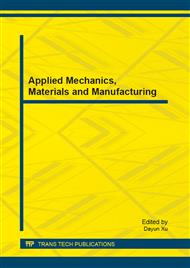[1]
M. Dorigo, V. Maniezzo, and A. Colorni: The ant system: optimization by a colony of cooperating agents, IEEE Trans. on Systems, Man, and Cybernetics–Part B, 26(1996), p.29–41.
DOI: 10.1109/3477.484436
Google Scholar
[2]
M. Dorigo, and L. M. Gambardella: Ant colony system: a cooperative learning approach to the traveling salesman problem, IEEE Trans. on Evolutionary Computation, 1(1997), p.53–66.
DOI: 10.1109/4235.585892
Google Scholar
[3]
T. Stützle, and H. H. Hoos: Max-Min ant system, Future Generation Computer Systems, 16(2000), p.889–914.
DOI: 10.1016/s0167-739x(00)00043-1
Google Scholar
[4]
M. Dorigo and T. Stützle: Ant Colony Optimization, 1st ed. Cambridge, MA: MIT Press, (2004).
Google Scholar
[5]
W. J. Gutjahr: A graph-based ant system and its convergence, Future Generation Computer Systems, 16(2000), p.873–888.
DOI: 10.1016/s0167-739x(00)00044-3
Google Scholar
[6]
T. Stützle and M. Dorigo: A short convergence proof for a class of ACO algorithms, IEEE Trans. on Evolutionary Computation, 16(2002), p.358–365.
DOI: 10.1109/tevc.2002.802444
Google Scholar
[7]
F. Neumann and C. Witt: Runtime analysis of a simple ant colony optimization algorithm, in Proceedings of. 17th international symposium on High performance distributed computing, (2006), p.618–627.
DOI: 10.1007/11940128_62
Google Scholar
[8]
W. J. Gutjahr: First steps to the runtime complexity analysis of ant colony optimization, Computers & Operations Research, 35(2008), p.2711–2727.
DOI: 10.1016/j.cor.2006.12.017
Google Scholar
[9]
Y. R. Zhou: Runtime analysis of an ant colony optimization algorithm for TSP instances, IEEE Trans. on Evolutionary Computation, 13(2009), p.1083–1092.
DOI: 10.1109/tevc.2009.2016570
Google Scholar
[10]
Y. C. Ho, R. S. Sreenivas, and P. Vakili: Ordinal optimizaiton of discrete event dynamic systems, Journal of Optimization Theory and Applications, 2(1992), pp.61-88.
DOI: 10.1007/bf01797280
Google Scholar
[11]
Y. C. Ho, Q. C. Zhao, and Q. S. Jia: Ordinal Optimization: Soft Coputation for Hard Problems. Springer Verlag, (2007).
Google Scholar
[12]
S. Ben-David, and A. Borodin: A new measure for the study of on-line algorithms, Algorithmica, 11(1994), pp.73-91.
DOI: 10.1007/bf01294264
Google Scholar
[13]
J. Aspnes, and O. Waarts: Compositional competitiveness for distributed algorithms, Journal of Algorithms, 54(2005), pp.127-151.
DOI: 10.1016/j.jalgor.2004.06.004
Google Scholar
[14]
J. Hüsler, P. Cruz, and A. Hall: On optimizaiton and extreme value theory, Methodology and Computing in Applied Probability, 5(2003), pp.183-195.
Google Scholar
[15]
D. P. Bertsekas: Nonlinear Programming, 2nd ed. Belmont, MA, USA: Athena Scientific, (1999).
Google Scholar
[16]
Z. Shen, Y. C. Ho, and Q. C. Zhao: Ordinal optimization and quantification of heuristic designs, Discrete Event Dynamic Systems Theory and Applications, 19(2009), pp.317-345.
DOI: 10.1007/s10626-009-0067-6
Google Scholar
[17]
Z. Shen, Q. C. Zhao, and Q. S. Jia: Quantifying heuristics in the ordinal optimization framework, Discrete Event Dynamic Systems, 20(2010), pp.441-471.
DOI: 10.1007/s10626-009-0087-2
Google Scholar


